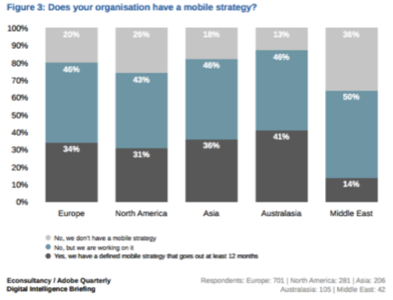Your mobile strategy is all wrong.
Perhaps “all” is too strong a word. If you even have one, you’re already ahead of the game. Less than a third of North American companies have a mobile strategy that goes out at least 12 months, according to a new Econsultancy/Adobe survey.
But for many of those organizations, that strategy often begins and ends with “fitting our website into a mobile app,” or goes only a few steps further, showing some key functionality within a mobile app. Neither is enough.
No, as Intercom vice president Paul Adams declares, the most effective strategies aren’t necessarily “mobile first.” They tend to revolve around customer experience more than any blind attempt to capture mobile devices. Translation: The optimal way to build a mobile experience is to define what the overall experience should be first, then figure out how mobile can help.
Mobile … Last?
With 90% of the world’s population over six years of age destined to have a phone by 2020, it’s not surprising that businesses have woken up to the need to reach a mobile audience. Indeed, most companies now at least pay lip service to mobile.
According to the Econsultancy/Adobe survey, just 31% of companies in North America claim to have a mobile strategy (34% in Europe). Meanwhile, a collective 69% don’t even have one:

At least some claim they’re working on it, though it’s not exactly clear what those strategies will include.
For many, as Paul Adams stresses, the answer is to focus on “mobile first.” That’s not necessarily the right strategy. (In and of itself, it’s not really a strategy at all.) “If ‘mobile’ is our future, why are almost all the most successful mobile driven businesses building web apps designed for larger screens?” he asks.
He’s referring to Uber, Waze, and other “mobile-only” apps that now also reach out to computer screens. Granted, the argument is not quite fully formed or very persuasive on its own—Uber still requires a mobile phone to actually hail a car, for example—but it does suggest that the complete user experience encompasses more than just smartphones.
What Are You Trying To Do?
Adams argues that sound mobile strategies require companies to figure out the “job-to-be-done.” This is very much a Clayton Christensen idea, a core concept espoused by Harvard’s innovation and business expert. It basically boils down to figuring out what jobs your customers are trying to accomplish.
This is the framework within which Adams suggests we’re doing it all wrong:
[W]e’ve been looking at “mobile” using the wrong frame of reference. For years I’ve pushed the idea that “mobile” is not about devices, it’s about access to consuming and publishing information. For me, obsessing about specific devices was a bad path (they change too frequently), obsessing about iOS versus Android OS was a bad path (they are both important) and obsessing about phone versus tablet was a bad path (they have merged into one larger category of portable screen and continue to evolve all the time). Information via screens not devices – this is the key idea.
But it’s not just about gadget choice or screen size. It’s also a matter of convenience. For example, in a recent panel conversation, John Bollen, chief digital officer for MGM Resorts International, talked about how a mobile app is a poor fit for its clientele, given that people visit Las Vegas every two years on average. Forcing them into downloading an app for that brief experience doesn’t make sense, so has invested in responsive websites instead.
Of course, he acknowledges that apps are exactly right in other contexts—as our check-in kiosks, check-out attendants and other screens. But rather than being fixated on a default “mobile first” model, he’s focusing on specific ways mobile can improve his customers’ experience.
Zeroing In On The Best Screen For The Job
Customers increasingly expect to get information, or have a particular experience, right now. That immediacy practically demands mobile. As Forrester analyst Ted Schadler told me, “Mobile is the ability to get what you want, on the device of your choice, in the immediate moment you need it.”
See also: Why Your Private Cloud Will Fail
The important consideration is whether you should offer only one way to interact with your brand, and generally the answer will be “no.”
For example, I’m unlikely to order my Dominos pizza from an Apple Watch, but I’d love the ability to track my pizza’s delivery to my house on it. I can see myself ordering an Uber and tracking it on a watch, but I wouldn’t ever want my phone to be my only means of authoring and reading email.
On this note, Adams cautions that we need to “think about the screen best suited for input, and the screen best suited for output.” Sometimes mobile will be the answer. Sometimes not. It depends on what the customer wants to do.
Lead photo by Jason Howie, chart courtesy of Adobe









